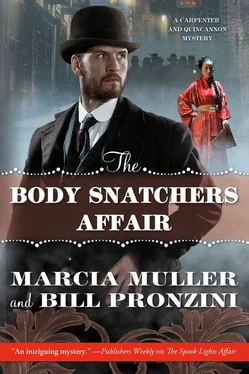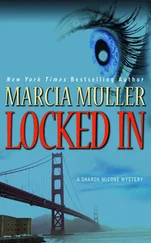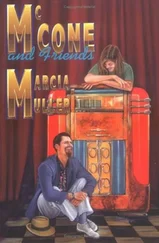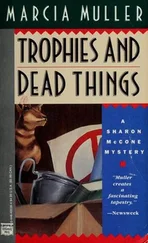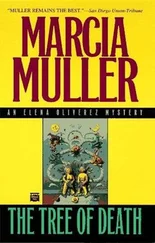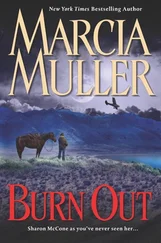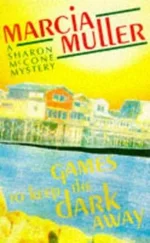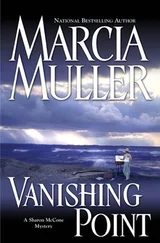When Sabina finished reading, she sat thinking for a time. Although Carson Montgomery’s name had appeared nowhere in any of the news stories, could he still have been involved and somehow escaped the fate of the others? By his own admission he’d roamed the Mother Lode during the 1880s, plying his trade in mines in several counties; the Gold King Mine in Amador could have been among them. And there was his reticence in talking about that period in his past. Yet she had a difficult time envisioning a man of his wealthy family background joining a gang of gold thieves... unless he’d been forced into it for some reason. And why had the bughouse Sherlock specifically mentioned Artemas Sneed, out of all the other known gang members?
She asked Mr. Ballard about Sneed, but he knew nothing of the man beyond his part in the high-grading operation. Which meant, given his infallible memory, that Sneed’s name had not been mentioned in the Call since 1887. He did recall that George M. Kinney’s health had failed rapidly after his incarceration and that he’d died in prison of pneumonia in 1892.
Puzzling and disturbing, all of this, to say the least.
Millie Munson was at her desk when Sabina returned to the city room. She was a tall, thin, rather plain woman who looked more like the popular conception of a schoolmarm than a society editor — a position she hated, but worked at diligently because it was one of the few opportunities for a woman journalist. In private, she had once referred to herself as “a semirefined upstart from the Arizona desert who can shoot the eye out of a rattlesnake at fifty paces.” She was also an excellent observer who seemingly knew everything that went on among the city’s upper echelons, and not above gossiping about it.
“What brings you here?” she asked, drawing Sabina to the chair beside her desk. Her brown eyes twinkled. “It wouldn’t be to make an announcement, I suppose?”
“Announcement?”
“About you and Carson Montgomery. My spies tell me you’ve been stepping out with him.”
Sabina managed a smile. “We have only had a few dates, Millie. Our relationship hasn’t gone beyond the casual stage.”
“But it might yet, hmm? Carson would be quite a catch.”
“I imagine he would.” She chose her next words carefully. “He’s not only handsome and well bred, but evidently a man of high moral character.”
“That he is. Though I’m sure he, like most men, has done his share of wildcatting.”
“But committed no blemishes on the family escutcheon?”
“Nary a one I’m aware of. If your feelings for him do lead to an engagement, you’ll be sure to let me know right away so I can break the news in my column?”
“On my oath.”
“Splendid! Now then, why have you come to see me? Something to do with one of your investigations?”
“Yes. Of course I can’t reveal the specific nature of the case, but it concerns one of the city’s more prominent families, the Blanchfords.”
“Oh? Some sort of financial matter?”
“Why do you say that?”
“Well, there have been rumors that Ruben Blanchford and his philanthropic foundation were no longer quite as solvent as they seemed before his death. You weren’t aware of that?”
“No. I understood he left quite a large estate.”
“Large enough, certainly,” Millie said, “but Ruben was generous to a fault in funding the foundation, and apparently none too wise when it came to recent stock market investments. The rumors hint at fairly substantial losses. Though if he hadn’t become ill and died, he might well have recovered. You never see society gents in top hats standing in the bread lines, now do you?”
“Come to think of it, no. Nor society widows such as Harriet Blanchford. What’s your opinion of her?”
“A rather headstrong woman, matriarchal, with conservative attitudes where money is concerned. She must not have been consulted when the bad investments were made. She’ll make certain the balance of the family fortune remains intact.”
“What about the son, Bertram? I understand he’s a promoter of some sort.”
Millie laughed, revealing her rather large teeth. “In his case ‘promoter’ is a polite term for dabbler in various not very lucrative enterprises, mainly those involving the so-called sport of kings.”
“What else can you tell me about him?”
“Not very much, I’m afraid. He shuns the social scene so I’ve had virtually no contact with him. One of those feckless young men who drift through life with little or no purpose, tolerated because of their background but not held in high regard.” Millie laughed again. “A bachelor not necessarily by choice, but because no self-respecting woman would have him.”
Ross Cleghorne, self-styled “florist to the wealthy and influential,” operated out of an elaborate shop on Geary Street. The fresh scents of myriad blooms and flowering plants enveloped Sabina as she entered, and she couldn’t help but be impressed once again by the array of floral arrangements completed and awaiting pickup or delivery; they were beautiful and original, with everyday items such as bits of metal, ribbons, fancy buttons, fragments of seashells, and oddly shaped and colored shards of glass nesting among the blossoms and greenery. Each of the various ornaments on display to complement his creations was also tastefully elegant.
Mr. Cleghorne was not a prepossessing figure, barely five feet tall and somewhat pear-shaped, but his effusive charm and impeccably tailored clothing more than made up for his lack of stature. To create the illusion of greater height, at least in his own mind, he wore his full head of white hair in an upswept pompadour and generous lifts in the heels of his patent-leather shoes. There was something endearing in his spritely salesmanship methods, at which he had few peers. They were on full display at the moment, as he succeeded in selling a well-dressed couple a rock-and-coral fountain for their daughter’s wedding reception.
When the transaction ended and his customers departed, Mr. Cleghorne greeted Sabina effusively, bowing and taking both her hands in his. “My dear Mrs. Carpenter. To what do I owe this unexpected pleasure?”
“A small corsage of your choosing. And if you will, the answers to a few questions.”
He smiled brightly. In addition to being an excellent florist, Ross Cleghorne, like Millie Munson, was not above discreetly telling tales about the city’s elite as long as they wouldn’t prove harmful to his business or his reputation. He had proven in the past to be an excellent source of information. But before he would impart anything, it was tacitly understood that a quid pro quo purchase had to be made. Hence Sabina’s request for the corsage.
“I have the perfect confection for you already assembled,” he said, beaming. “I shall fetch it once we’ve had our little talk.” He drew her to a corner of the shop, out of hearing of his assistants at work in the large room behind the sales counter. “What is it you would like to ask me?”
“In the strictest confidence, Mr. Cleghorne.”
“Of course, dear lady. I often indulge in a bit of gossip, but I never reveal a confidence when sworn to secrecy.”
“It’s about Carson Montgomery.”
“Ah! The handsome and eligible Mr. Montgomery. You and he have been keeping company, I’m told.”
Everyone seemed to know about her and Carson. Did that include John? If so, he had shown remarkable restraint in not confronting her with the knowledge.
She repeated what she’d told Millie about the casual nature of the relationship. Then she asked, “How well do you know Carson?”
“Not well. A customer now and then. Pleasant chap, well mannered.”
“He worked in the Mother Lode gold mines in the mid to late eighties. Do you know anything about that period in his life?”
Читать дальше
